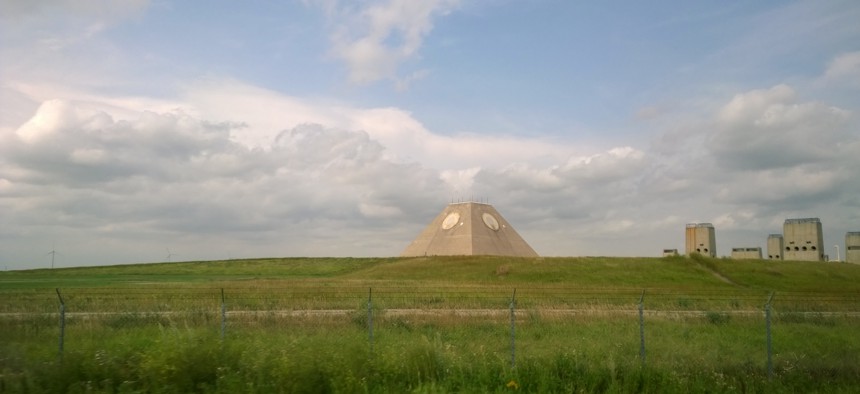Connecting state and local government leaders
After sitting unused for decades, the 300,000-square-foot, mostly underground building will be converted to a secure data center whose excess C02 and heat will support an indoor greenhouse.
In Nekoma, North Dakota, a Cold War-era building is becoming decisively modern as it goes from a military installation to a data center for high-performance computing and data processing. What’s even more forward looking is that waste heat from the servers it will house will warm an onsite greenhouse.
The Cavalier County Job Development Authority announced in July binding agreements for Bitzero Blockchain, a data center developer, to redevelop the historic Stanley R. Mickelsen Safeguard Complex, also known as “the pyramid” because of its distinct shape.
After sitting unused for decades, the $6 billion, 300,000-square-foot, mostly underground building will have a new use that isn’t a far cry from its original purpose, said Josh Teigen, director of the North Dakota Commerce Department’s Economic Development and Finance Division.
“It was used to process and mine tons of data for missile defense through the United States against Russia,” Teigen said.
Although the structure lacks existing infrastructure for connecting to the power grid because it was designed to generate its own power and be undetectable, Bitzero will rework it to run carbon-free, renewable power. That’s in line with the work the state has done with carbon capture and sequestration. Its goal is to be the first carbon-neutral state in the country by 2030.
“North Dakota was blessed with just phenomenal geology that allows us to store every CO2 molecule that the United States produces in the year for 50 straight years underneath North Dakota,” Teigen said. “So not only did we have this really unique site, but we also have the ability to decarbonize fossil fuels, so we can still provide electricity using fossil fuels, but without the CO2 because we do it with carbon capture and sequestration.”
And because data centers inherently consume a lot of electricity and produce a ton of heat, part of the deal with Bitzero is to capture that output and use it for purposes other than releasing it into the atmosphere. In this case, the heat will be piped into a greenhouse.
“And the two things that crops love are heat and CO2,” Teigen said. “If we have tons of CO2 from our carbon capture and sequestration efforts [and] now we have a bunch of heat from the data centers, let’s blend those things together and … grow fruits and vegetables and all kinds of other things year-round, rather than just in the summertime.”
Additionally, because it’s highly secure – the pyramid was designed to be impervious to nuclear blasts and electromagnetic pulses and has 7-foot thick steel-lined walls, Teigen said – it’s possible that the data center will house government data.
The pyramid is not the only example of data center construction doubling as environmental advantages. The Digital Crossroad in Indiana repurposed the former State Line Generating Plant into a data center and partnered with Purdue University Northwest to build a 4,000-square-foot smart greenhouse that will take some of the waste heat from the data center and use it to grow crops.
The idea isn’t necessarily new. In 2008, the University of Notre Dame’s Center for Research Computing worked with the city of South Bend, Indiana, to relocate a cluster of high-performance computer servers to the Potawatomi Park to create a grid-heating framework. Two years later, Syracuse University reported that excess heat and cooling from its SU-IVM Green Data Center are used by the building next door.
The use of waste heat from data centers is likely to grow. In 2020, data centers accounted for about 1% of worldwide electricity use each year, and a single typical large data center can produce 20 to 50 megawatts of heat. Data Center Frontier reports that California will mandate waste heat recovery for data centers in Title 24, the state’s building energy efficiency standards, which are due to be updated in 2025.
J. Duncan Shorey, an environmental attorney and geothermal expert, announced The Foundry Project in 2015 and its plans to redevelop an 8-acre brownfield near Cleveland that would recycle waste heat from an underground data center to provide heat for an aquaculture farm called the Northcoast Fish Farm.
The plan didn’t pan out, though, for two main reasons, Shorey said: Demand for data centers seemed to be decreasing (although a 2022 report indicates that the market is currently robust), and the data center was to be located near train tracks, which raised security and safety issues.
It’s still feasible, however, he added. In fact, it’s happening in Norway and Japan. “What would be ideal would be to find a location where you can access both low-cost power and develop a use or develop a corresponding use, that would benefit from the warm water,” Shorey said. “Warm water can be used in any number of ways.”
In North Dakota, Bitzero plans to set up its headquarters for North American operations and to build 200 megawatts of data centers in the state within three years. It expects The pyramid project to cost $500 million and to result in 35 to 50 jobs when the building becomes operational in the second or third quarter of 2023. Additionally, the company will construct a museum to pay homage to the site’s history.
“I think that’s really cool that it’s going to be not just an economic development project, but also a lot of community development and vibrancy,” Teigen said. “They’re going to be bringing in art displays from all over the world and displaying them building the museum,” he said. “It’s going to be an attraction, not just for Fortune 500 businesses and employees, it’s also going to be a great tourism and recreation location for the community.”
Stephanie Kanowitz is a freelance writer based in northern Virginia.



